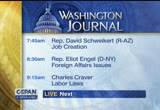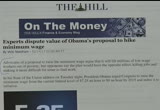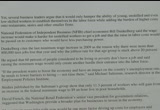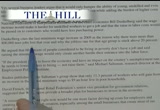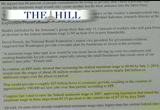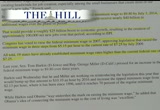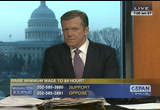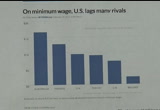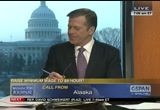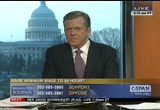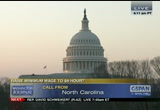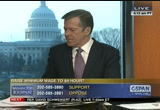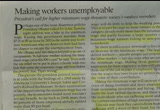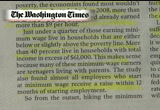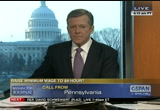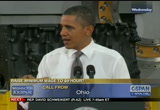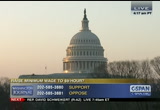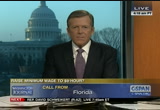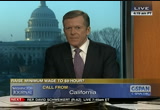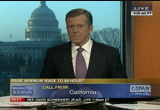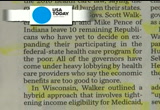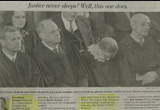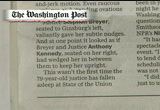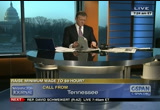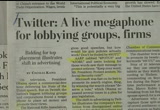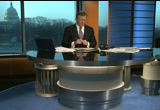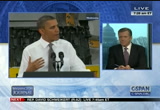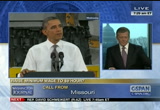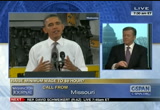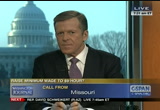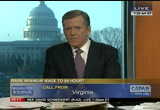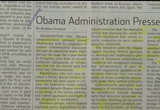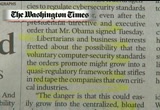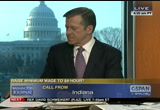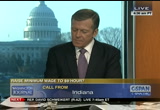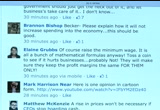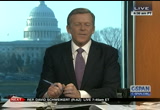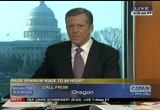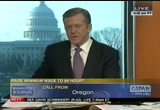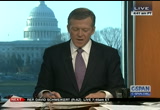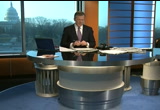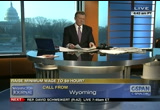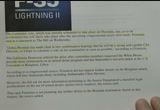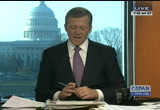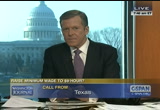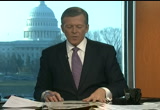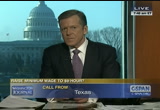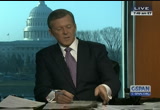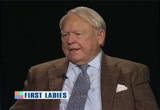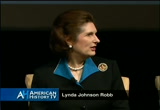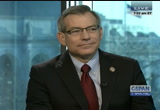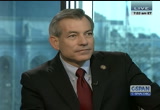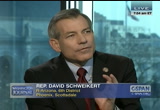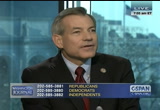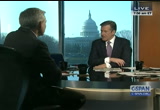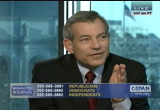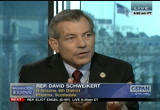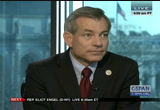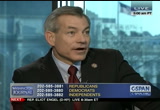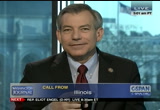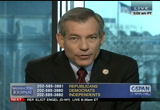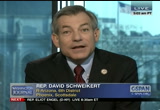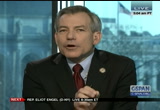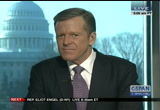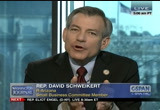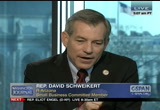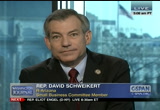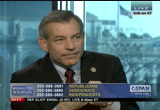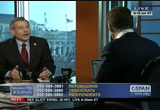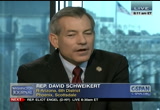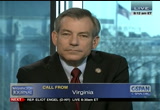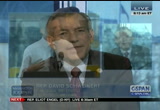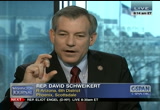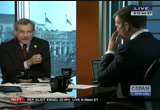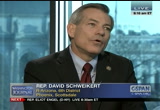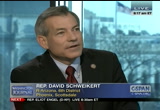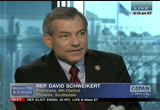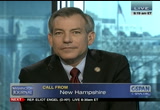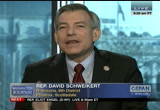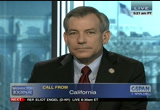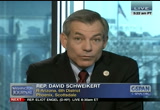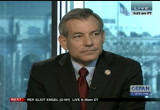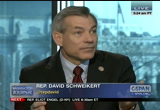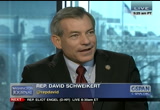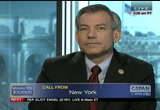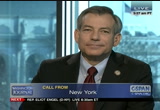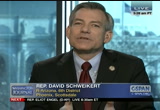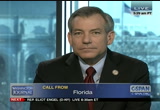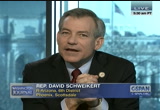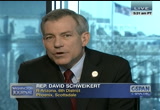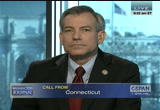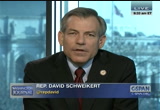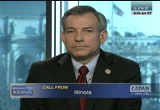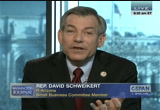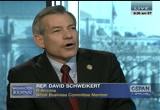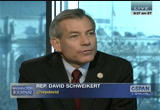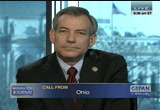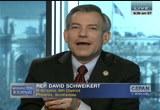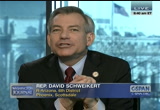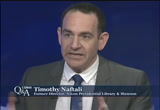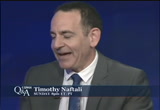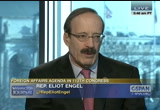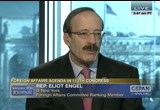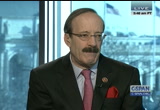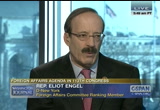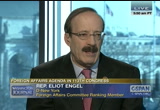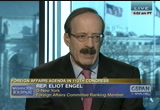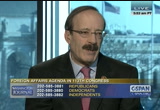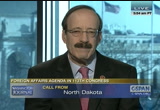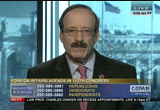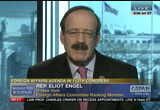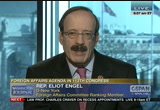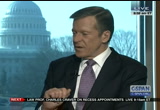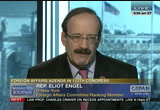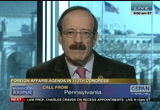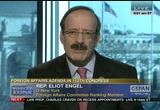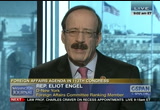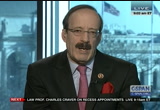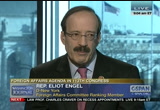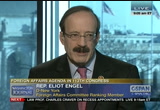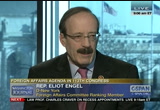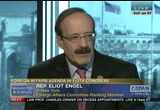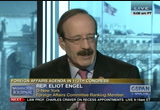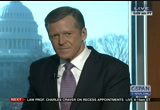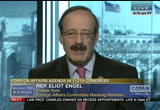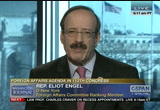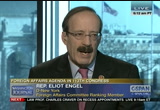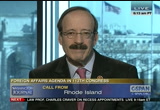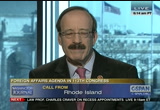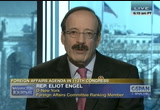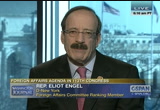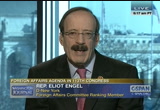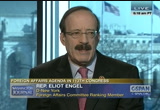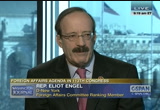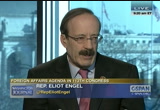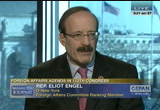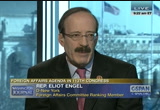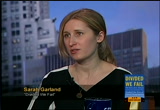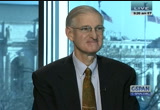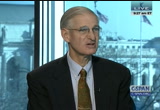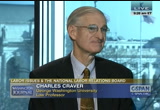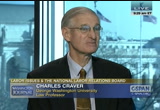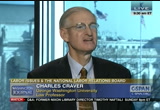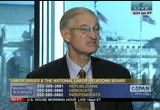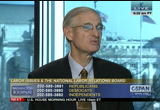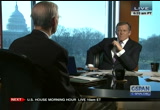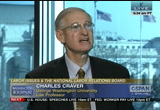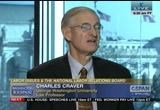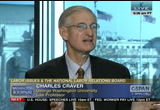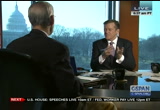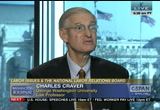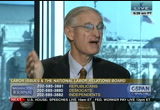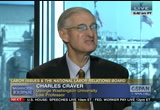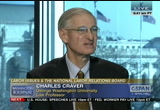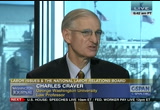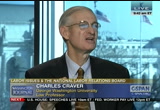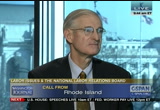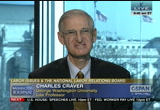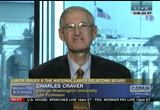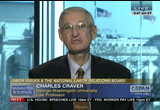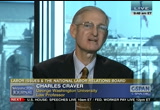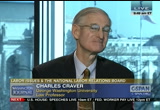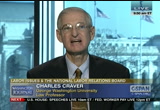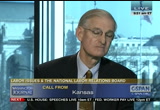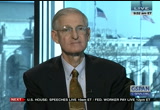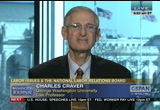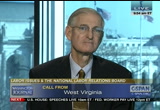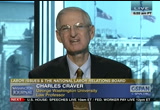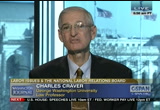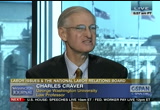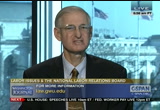tv Washington Journal CSPAN February 14, 2013 7:00am-10:00am EST
7:00 am
rt.hweikety also with eliot engel. host: the house is in session today at 10:00 a.m. and the senate is planning a preliminary vote on chuck hagel's nomination as defense secretary on friday. the president is in decatur, georgia today talking about his state of the union speech. this morning we are continuing our discussion about the president's state of the union speech tuesday night. here was one of the proposals he made. three things we should be asking. number one, how do we bring more jobs to america? two, how do we equip people with
7:01 am
the skills they need to do the jobs? number three, how do we make sure that once they have a job, it leads to a decent living? i believe we reward the effort and determination with wages that allow working families to raise their kids and get ahead. [cheers and applause] that part of the reason why i said last night that it's time for and increase in the minimum wage, because if you work full- time, you should not be in poverty. host: at was the president. from the hill newspaper this morning --
7:03 am
we want to hear from you this morning whether or not you support the president's call to raise the minimum wage from $7.25 an hour, the federal minimum wage, to $9 an hour. if you support the proposal, 3880 is the extension to call. you can go ahead and start dialing in. we will take those calls in a minute. back to this article in the old newspaper -- the hill newspaper.
7:06 am
reggie in west orange, new jersey. what you think about the president's proposal? caller: it's a good idea. they gave the demographics that would be affected by this wage increase. it even makes more sense, especially in light of the fact that one-third of these women are already married and most likely have children. it's very difficult across the board to maintain a standard of living, even if one did all the things to prepare oneself for the labor force and and earning an income that is commensurate with the standard of living. what has happened over decades in this country is that industry
7:07 am
has lowered the standard of living across the board throughout the world. now forces in the political hierarchy want us to work until we die, even though we are contributing a large portion of our earnings. host: are you a minimum w age earner? caller: i was not, for most of my career. host: you can contact us via social media. non-consent us a tweet -- you can send us a tweet. or post a comment on our facebook page. or send an e-mail. this article --
7:09 am
that's cnn morning news. clint in houston, arkansas, on our oppose line. caller: that's actually houston, alaska. host: that's actually what it says on the screen at. caller: >> no problem. ussilla.t outside wasel we live in one of the highest cost of living areas. i strongly oppose raising the minimum wage, due to the fact that the local economy here will suffer.
7:10 am
they will not be able to hire as many people with a higher minimum wage. but we are all welcome to our own personal perspective on that. that is my perspective. host: are you a small business owner? what kind of work do you do? caller: i work for a locally companydrainnd wateand company. i make more than minimum wage. it is due to my skill set that i have achieved through my career.
7:11 am
people should learn more about than minimum wage if they prepare themselves and get educated threw their career. host: jack is on our support line. caller: i am so glad to see the uprt that you put comparing the other countries. i did read in one of the magazine's. they quoted australia's minimum wage. the authors said that they got the crazy idea that consumption drive their economy. that is the clincher. you put more money in people's hands and they have more money to spend, which is good for everybody, in my opinion. host: anthony in louisiana. good morning.
7:12 am
what do you think about the president's proposal to raise the minimum wage to $9 an hour? caller: i would like to see it happen, but it's bad timing. once things are coming down around you, you don't add more to the top of the heat. you try to stabilize what you've got. it don't make no sense right now at this particular time. host: it started off saying that you would like to see it happen. caller: i would like to know, in a perfect world. as things get better, yes. but right now everybody thinks this country is too big to fall. i'm afraid they are mistaken. things going on right here are going on abroad in egypt and this and that. what's to say it could not happen to us? you load enough of on a trailer
7:13 am
and eventually the tires will blow out. host: washington state has the highest minimum wage at $9.19 an hour, followed by oregon, vermont, nevada, connecticut, district of columbia, and illinois at $8.25. federally mandated minimum wage is $7.25 an hour. on twitter -- the washington times has an editorial this morning on the minimum wage.
7:15 am
tyrone in philadelphia, good morning. caller: good morning. i support the minimum wage raise. just look at it. they talk about deficit. what about a family that on a permanent deficit? you are making $14,000 and a gallon of milk is $4 a gallon and it's the same for a millionaire. when we look at it, do we want a permanent underclass? we are americans. you take care of your people. it's ridiculous. it's a no-brainer. the business people are keeping their money out of the game right now, knowing that you are suppressing your people. we are better than that. that's all the president was trying to tell them, we are a better nation than that. we want to see people, out of
7:16 am
poverty. -- come up out of poverty. host: erica in akron, ohio. caller: thanks so much for giving me the time to be on the phone. i do oppose. [indiscernible] to the government to, i have --with all the rules and regulations being enacted at the moment, some things will shake out. it's just the beginning of the term for mr obama, which i am really glad that we have a black president for the first time and that is doing a really great. great i do approve democracy 100%. i am a democrat.
7:17 am
in regard to the two points. are you still there? host: a if you could get to the minimum wage. caller: bringing to the minimum wage up to $9 and ours is kind of high. -- $9 an hour. if we look at an increase of $1.50, that's a burden to employers, even if you have one employee. we have seen increases in the minimum wage throughout history. typically it does not go up a whole dollar. it does not make much sense in regard to the cost of living and [indiscernible] .
7:18 am
it's not going to help. i think the minimum wage needs to be increased. it should not be more than 95 cents. there are a lot of rules. host: i think we get your point. dawn is in florida. caller: i totally support the increase in minimum wage. i work for fortune 500 grocery chain that's in the top 100. i make $9 an hour. they make billions a year. i an a cashier.i sca i scan food all day that i cannot afford to eat. i watch my fellow co-workers. in ramen noodles -- my co-
7:19 am
workers eating ramen noodles and they cannot afford to pay their utility bills. these are families taking these jobs and there are no other jobs for them. none of us can afford cars. i have broken stove, a broken washing machine. things are tough down here. i just think the rest of the country does not realize there's a lot of depressed areas that people that are trying to support a family are trying to support them on that kind of incumben -- income. host: mike is in atwater, california. caller: that last caller almost broke my heart. wow. i oppose it. during the 1990's i work for
7:20 am
walmart. the minimum wage was raised three times between the federal and california. i saw my wages initially -- walmart had to raise our wages because we were below minimum wage. whiche next two wilraces, were much smaller, we did not get a raise. so the people that were starting work got more money than the people than had been working there for three years or four years. walmart was being kind of unfair. i noticed that after the minimum wage was raised, the prices of everything started going up. it seems like when the minimum wage goes up, all the businesses start raising their prices to adjust for minimum wage. so, the money that you have made from minimum-wage is eaten up by
7:21 am
7:22 am
7:24 am
best from the washington post this morning. the next call on whether or not raised the minimum wage as proposed by the president on tuesday night, tina in nashville, tennessee. caller: hello. i think it's good. i wish it was a little higher. have done a lot of scenarios, working on a minimum wage. what i see is the family of 4 better earnings two times the minimum wage between the two, they get rebates right now back f from now paramountor tax credits. so they get their money backed what they paid in. plus $1,700 for a family of
7:25 am
four. it seems to me that is being paid by taxpayers and not businesses. i think the businesses should be paying those people and not the taxpayers. if people cannot afford what the businesses after a charg -- past due and charged to pay the people what they need to pay them, then they need to figure out their business model and maybe pay their ceo's a few million less. host: there is this picture of president leaving asheville, north carolina, on air force one. and from the washington post --
7:28 am
7:29 am
they have higher rates. i would be interested in knowing. i think france is pretty high. i don't know about australia. i am retired now, but over the years i started off at a minimum wage. just a high-school graduate. i finally found a job and worked myself up through the company. something my dad told me years ago, both my parents were college educated, was if you don't want to go to college, find something you like, " because you will be doing it on time. host: next call from julie in missouri. caller: good morning. i was calling to support the $9 per hour, because i am 50 years old and i did have education. i understand a woman who called from florida about trying to
7:30 am
make it on minimum wage. i was a successful real estate agent at one time. then the economy collapsed, so i had to take a job at $8.15 an hour. our company was doing so well and had record-breaking years that they had slashed pay to $7.50 an hour. i do support it. i understand some companies cannot afford to pay the $9 an hour. i live in a rural part of the country where people my age are having a hard time finding a job. we have to drive 30 miles to get their. at the price of gas and cost-of- living, it is impossible to live on. as far as the tax breaks go, my husband and i only got $461 back
7:31 am
from our taxes. host: is your husband also and minimum wage worker? caller: yes. and i finally had to quit my job to go work at a golf course. i was making $9 per hour. it is seasonal. right now i am unemployed. that's the only job i could find. a 200 mile radius. host: both being minimum wage employees, do you get any assistance? caller: no. host: no rent assistance for food stamps? caller: no. i own my own place and my mortgage just went up yesterday. i'm paying $700 a month. my washing machine is broken, so i'm washing clothes in my bathtub to hang them up outside before putting them in the dry air. i am just like the woman in florida. it is not just happening in this
7:32 am
part of the country. i have relatives all over this country that are in the same shape that i am, with higher educations. host: all right. next is doug in arlington, virginia. caller: hi, peter. we have to get rid of this minimum wage business entirely. it is the silliest idea in the history of politics and economics, because government can decree that you will pay a worker any amount that it wants, but it cannot decree that person's labor is going to be worth it. if he's putting $5.50 of labor per hour because he's young or dispersed job or he's unskilled or just does not know what to do yet, making you pay him $9 an hour will ensure that he is unemployed and never gets a chance.
7:33 am
it's a terrible idea. it's a relic of the 19th century, like most of our labor laws. host: what would you say to the two callers, from charlotte, and julie "hotmed call", both still making minimum wage in middle age? caller: they will have to just get more productive. they will not have jobs if they raise the minimum wage. they cannot hire people if they cannot do $9 worth of work. host: this article in the wall street journal --
7:35 am
just a little bit from the wall street journal and the washington times this morning. in indiana, ed. caller: hello. i had to laugh at the last guy from virginia. he's a clown. let's go back a few years. if people remember back when the united states still workers got a raise, the steel company raised the price of steel. then the car companies had to pay more for steel to build cars. when this happens, they passed that on to consumers by raising the price of a car. i think these businesses can do that today. they do do it today. any business that's not making a profit today -- because i think all businesses are making more profits today than in the history of this country -- if
7:36 am
they cannot do it, i say they have poor management. i support to this $9 per hour. some of these people have had to work for less than that. they find out it's not that easy. a waitress job is not easy. she gets tips, shasta share them with the busboy and the bartender and everyone else. maybe she has a couple children she has to raise. the people of this country it ought to quit whining about what the president is doing and try backing him for change, because this country is in bad shape. if we keep going the way we are going, we will be just like a third world country in a few years. the people whining and crying and these people say they don't get profits and they want to make more, it's nothing but greed from the company's. -- companies. there's a thing about mcdonald
7:37 am
that something will hurt their profits. i'm retired. i was a supervisor at union carbide for 20 years. we did not have a union. we worked. like the man said, you want a fair wage for their day's work. if a guy puts in eight hours a day, he should get a fair wage. host: thanks for calling. on facebook --
7:38 am
7:39 am
opposed to raising taxes on the rich. in the end, all it will do is cause unemployment for the middle and lower class is. they're just going to outsource to places like china and japan and places that don't have minimal wages. host: all right. that resulted in springfield, oregon. we have another call from springfield, oregon. richard on our support line. caller: hi. i am for it. we should put up that clip from ted kennedy on raising the minimum wage. i think it is immoral for people making less than what it costs to live. it is the absurd. i see people here in eugene and
7:40 am
in springfield who cannot make it. what it does is puts them on food stamps and they have to go to the emergency room. we are actually paying more money. minimum wage is -- it is good that barack obama said they should have the cost of living attached to it. high above that was a wonderful thing. if the wages caught up with the cost of living, maybe we would not have so many problems with fighting with teachers and firemen and police. host: thanks for calling. from "politico" --
7:43 am
what do you think about the president's proposal to raise the minimum wage? caller: it sounds good and compassionate, but people need to understand the that the minimum wage is for first time job people, teenagers and stuff, their entry into the job market. there's a learning curve to learn to be to work on time, work well, things like that. that's why it is such a low rate. it's not meant to be a job you will have for the rest of your life. something else people don't think about is that money that they pay, to dollars an hour more than, his proposing than, it does not come out of thin air. it comes from the employer. they will just raise the cost of their products to keep the same profit margin they have had. it is just going to be a moot
7:44 am
7:45 am
7:46 am
linda is in texas. what do you think about raising the minimum wage? caller: it's a great idea. tying it to the cost-of-living index would also be really great thing to do, because i am still smarting from every time the gas companies raise their prices through the roof and everybody from the grocery store to the clothing stores can justify increasing the price of their goods because it costs more to get it there. when the prices awere down, their prices did not go down, on
7:47 am
7:48 am
time for one more call. this is jeff in texas. caller: how are you doing? i'm against the $9 per hour simply because i'm a business owner and i cannot afford to bring somebody in that does not know what a screwdriver is and teach them in from the bottom up at $9 an hour. i don't mind training them at $7 an hour. i can get that back. once you start raising the minimum wage, especially putting it to the cost of living expenses, that is raising their expectation of my employee to get more than he deserves. all of my field employees make a lot more than $9 an hour when they are working. i don't see why i should have to
7:49 am
pay somebody who does not know what a screwdriver is $9 an hour to teach him. host: have you had that experience? caller: yes. i own a plumbing company. i had to teach my new employees with the tools are and how to handle tools. they come to me with very low skills. host: does it make a difference between $7.90 dollars as a business owner? caller: it does. i will have to raise rates to my customers to cover it. when i give skilled labor to a worksite, i charge my customers for the skilled labor. when i take unskilled, i charge my customer for unskilled labor. host: that was jeff in texas calling, talking about our first topic, which was the minimum wage. coming up, we have two members of congress. a republican of arizona will be
7:50 am
here, followed by a democrat from new york. we will be right back with representative schweikert. >> ♪ >> after president-elect andrew jackson's wife died in december of 1828, her niece family assumed the role of first lady. >> paul goodman negatives washington had to say about andrew jackson, they loved family. negatives thate washington had to say about andrew jackson, they love at emily. she became his acting first
7:51 am
lady. she entertained beautifully. she was polished. she knew exactly how to do the things. truck spill she was one of the ladies >> one of the women to serve as first lady. these and one of "first ladies: image and influence" begins on presidents' day. -- season one. >> he thought she was the smartest person he ever knew and he knew that she would tell him the truth. she was not going to sugarcoat. one of the tapes i absolutely love that came out was the one where she is analyzing his
7:52 am
speech. he asked her to do it, but she was really tough on human. >> it started out nice. [laughter] >> mother always did start off nice. she "just, no, i think you should do..." he used to tell me your mother has the best judgment and you should always listen to your mother. he was devoted to american. >> remembering ladybird johnson on the anniversary of her birth. sunday night it 7:30 on c-span3. washington journal continues. host: joining us on the washington journal is representative david schweikert, a republican from arizona, a member of the small business committee in the house. we were discussing the
7:53 am
president's proposal to raise the minimum wage to $9 an hour. guest: my wife and i have a little game we play called think like an economist. if the president really is concerned about urban unemployment of view, particularly minority youth, which is astronomical numbers, you would've thought the proposal would of been for this population, for these urban areas, i will do a training wage, i will do those things necessary to expand employment. we know that in the economic models, raising the minimum wage almost 20% is going to raise. raise. -- is going to raise their unemployment. it's great pandering to the political base, but it's bad economics. host: why are you on the small business committee? guest: i'm on small business, science, and technology. the chairman was kind enough to
7:54 am
give me the chairmanship of the oversight subcommittee. host: you come from small- business backgrounds? guest: yes, investment businesses, real estate businesses. i was on financial services before. i'm one of the four members who was removed from their committees in december. you make the best of it. one of the great things is i represent scottsdale, phoenix area. eaven. entrepreneurs hav we represent many small businesses. host: are their residual effects by the removal for the republican leadership? guest: i think there are. it's not the way i would love to have gotten there. but i think it forced a family discussion of how you deal with those who are very economically conservative?
7:55 am
and get us to work and talk to each other? in many ways, except that the people of a handful of conservative to feel they were being isolated and cut out of the process to force the conversation. host: something you have talked about in recent days is the. the brand the lead editorial this morning in usa today -- guest: i think that is actually substantially fair. we really are the party of economic growth. i do budget town halls all over arizona and i have done about
7:56 am
100 of them. we start to look at the numbers. new cannot tax enough or cut enough to get us back to a level of fiscal sanity. it has to be done through economic growth. there's one nugget of optimism i got from the president's state of the union last night or two nights ago. that is willing to do tax reform. david kemp is trying to go into a it ever, broader tax system. we know that would maximize economic growth. has a republican, we can start to say we are going to have to deal with fiscal insanity that's happening, but we will partially get there by growing this economy. host: 1 nuggets of hope is all you heard? guest: yes. i was very saddened. it's a beautiful speech.
7:57 am
he's a great speaker. he knows how to smile and nod at the right moment. if you actually have read the speech with your highlighter and the notes of to the side, you start to realize the absurdity of many of the president's own comments. nothing in my proposals are going to raise taxes, by the way and there's 59 new programs. if you are on the right or left, the american people are tired of being played. at what point do you start to hold particularly the leader of the free world and start to say, this is your fifth state of the union speech, on the previous four you gave platitudes and the proposals and they never showed up on paper, are you selling as ideas? are you actually and delivering policy on paper? host: two more questions before
7:58 am
we go to phone calls. these are both from the front page of your home town newspaper, the arizona republic -- what are your thoughts? guest: it's a huge deal for being a border state. we see it from several levels, both on legal border crossing the illegal border crossings, being a state that has often had a very vibrant housing market and that housing market is coming up and that often becomes an attraction for illegal labor or undocumented labor. for a lot of us, alsousthe the real debate is what the future -- for a lot of us, the real debate is what does the future look like? will immigration be like that in canada or great britain and where it is a point-based systems. if we have a shortage of
7:59 am
electrical engineers, electrical engineers moved up in priority? this goes back to the discussion of new design and immigration policy that maximizes economic growth for the nation. or do you continue to focus on what a familial.migration system which may be more family friendly, but if you believe you have a moral obligation in political leadership of growing jobs, stabilizing the country, and making sure you have economic growth to cover medicaid and medicare and social security, the point system, bringing in talent from around the world, maybe the best economic move. but it will create a clash of political ideologies. host: finally, a big story, the front page of the arizona republic -- guest: it is a huge deal for tempe, which is the home base.
8:00 am
we have been looking carefully at what it will do to our employment base. women lose some white-collar executives moving to texas --- we may lose some white- collar executives. the vast majority of employment for usair is airport-based and renovation-based and maintenance-based. might lose some senior executives -- we might lose some senior executives. that is a wonderful hub. host: you are thinking the headquarters may move to dallas.
8:01 am
guest: so for not all the details are out. i want the phoenix airport to stay a major hub. that becomes an economic engine for the community. host: david schweikert is our guest from arizona. costella and a little bit of phoenix -- scottsdale and a little bit of phoenix. guest: it is a wonderful district. it will be 75 on saturday. host: derrick is a democrat. caller: i voted for republicans in local contests sometimes. it is about the idea.
8:02 am
the republican party seems to always be against the majority of america. whenever it comes down to doing something that will affect the people such as the minimum wage increase, they always say, it will cause unemployment to rise. you hardly ever hear them go against something to help businesses. guest: you live in the chicago area? how is the unemployment for youth minorities' right now in your community? caller: it's high. guest: what is the minimum wage for illinois right now? caller: $7.15 was something like
8:03 am
that. guest: you can do good political rhetoric or you can do what is honest and takes care of people. that is one of my great frustrations in washington, d.c. sometimes the speeches are more about political power than helping people. shouldn't the discussion have been, we have a devastating level of youth unemployment in cities like yours. let's focus on that because we love and care for people. we do what is good and political but may not be honest economics. host: current federal minimum wage is $7.25.
8:04 am
bob in chesapeake, virginia, independent line. caller: representative, the minimum-wage is used as a political football. i think would be a good thing if we would set the minimum wage on all of the jobs in the country as a national need and a global competitive need instead of letting the minimum wage be brought up every so often as a political football. they need to set the minimum wage on all the jobs. then they can eliminate the union hassles and we can be more globally competitive. guest: you are correct it is used as a political football to get you some wonderful movement on your political base.
8:05 am
if we were to think like an economist, you would not have a minimum wage. you would allow the market to generate those wages. if you're going to move to a minimum wage, are you going to have the training wage and for those folks who are 16, 17 years old just entering into the job market? it locks out the folks just entering the job market. there is a lot of the data here. host: teresa from connecticut. caller: hi, peter. i wanted to say i'm a diehard republican. i believe president obama is the
8:06 am
most dictatorial president we have ever had. as far as the minimum wage, i believe we need to get it a little bit higher in certain areas because people cannot live the way it is today with prices sky-high. as far as immigration, i think it is a travesty. on those issues, i like to your comments. god bless you. you take care. thank you. guest: back to the minimum wage. you want to be compassionate. in have about 11,500 of our brothers and sisters go on food stamps every single day. are you pushing public policy
8:07 am
that will increase unemployment? we need to be focused on those things that expand economic growth and create more jobs. you completely walk away from all the other responsibilities of the tax code or the regulatory environment that would get the economy growing. if you want wages to grow -- what we've done to the middle class has been devastating. immigration will be one thing we will hopefully get to an honest understanding of the policy and the facts. you opened with a comment about the president's administration. a friend of mine admits the
8:08 am
president that promise to be the most transparent and open to not turn out that way. i have not heard members of the left just being brutal, "you promised open government and sunlight into the workings and you did just the opposite." this is an interesting conversation. the left was brutal to the previous administration on guantanamo bay, extradition, the use of drones. that same left is almost mute when this president has gone further and broken his promises. host: speaker boehner held a press conference yesterday and said the house would not pass
8:09 am
any sequester bills until the senate does. the speaker was tired of having legislation die. guest: we have spent two years negotiating with ourselves. we sit there and wait for the president to deliver an honest budget. the president gives these beautiful speeches and sends a budget that not a single democrat will vote for. i cannot tell you how many times the president would say, i demand compromise and shared sacrifice. there is a process where the senate does a budget and the house does a budget and it will be nasty and grind it out. if the other side does not do
8:10 am
their side of the heavy lifting, how do you go to conference committee? once again, great rhetoric from the white house but it is not based in reality. absolutely. we did the jobs bill last year. the idea was to focus on small businesses that are growing. how do they get capital, on a bank or from families and friends, doing those things necessary to grow the economy? choice in health care. so much more available. we cannot get the senate to work with us.
8:11 am
more choice and opportunity in education and it dies in the senate. we had the big success of our jobs at that moved through -- jobs act. finished doing the work that was supposed to a been done months ago on developing the rules and we can start to see the capital flow into those businesses. host: what do think about the president's potential executive order on climate change? guest: it borders on a bizarre. the president is not a dictator. the arrogance from the white house is almost like a child stopping and saying, i didn't get my way so i will try to do through dictatorial mandate.
8:12 am
we are a nation of laws. provide detailed ideas and run them through your senate. that is your body. let's see it on paper. instead you will do it through executive order. how far is its president willing to push it/ host: virginia beach. caller: hello. thank you for c-span. i wonder why the teenage wages is being discussed so heavily when the president said full- time workers having minimum-wage of $9 an hour. most teenagers are doing part-
8:13 am
time jobs. it didn't sound like a cover part-time jobs. our virginia legislature or governor was talking about of saving some much money by having people under 29 hours a week instead of 39 hours a week that they used to do. host: let's get a response. guest: wouldn't it have been wonderful if the president cared enough about minority youth unemployment that the president said, "i care and we will work towards a training wage, especially in these areas with devastating levels of unemployment." that is not what he said. that is not what i heard.
8:14 am
the minimum wage statues to not make that bifurcation of, or slightly under 40 hours so you get a different wage. that is not how the lot is written. -- that is not how the law is written. that is just not true. if you go on google and look at the economic data. it is the type of arrogance -- you need employment. you need that multiplier effect in the economy. country keep raising their minimum wage. you lower the amount of employment. some will make more but a huge
8:15 am
number will now be on the unemployment rolls. we need to expand unemployment and that will create the competition for people who will show up at work for the labor. host: two more tweets, different topics. guest: i love gabby. i've known for a long time. let's have an honest discussion based on fact and not feelings. in some ways it was outrageous what the president did at the state of the union.
8:16 am
"vote the bill, vote the bill." we now have constitution carried in arizona. constitution to carcarry says is you're right to carry a firearm. i was the house majority whip as a much younger man and i'm back in politics. .et's be completely honest look at states like texas, arizona, and florida and looking at states like illinois it that have restricted rights. what are safer? let's face the conversation on fact.
8:17 am
are you willing to go to the other attributes of these horrible tragedies, practically what happened in tucson, mental health issues. when sheik fearful of turning in jared loughner thbecause of her fear of being sued? --was chief fearful of turning in jared loughner ? we have debates about the firearm looking scariny. we have 10 years of data. did nothing. time to do policy by facts, not feelings.
8:18 am
host: darryl follows up. guest: no. it is a horrible way to conduct policy. the executive branch has some discretion on how to manage. fine. executive orders have been around forever. when it is being driven to push a vision of policy, i'm sorry. to my friends on the left, wouldn't you be apoplectic? policy is the purview of congress. put it detailed on paper and take it to the senate and drive it as a piece of legislation. whether on the left or right,
8:19 am
respect the separation of powers. a couple of generations from now, that will lead us down a dangerous path. host: jim in new hampshire. caller: good morning. i am a retired small-business man. how can you in congress and the senate justify to the national voting throughout the country, how can you justify the time you are out of session directly? and atbe out next week the end of march. you had your republican conference. one week the democrats have it in a different week. why don't you show up when your
8:20 am
schedule says you will show up? guest: when i first got elected, i felt exempted the way you were speaking right now. just because we're sitting in does it mean work is getting done. i will get on the plane on friday and i will be all over my state and district for the next week. ruby meetings -- there will be meetings. in many ways those times at home are not vacation. it is learned what is going on in the district and my country and meeting with constituents trying to educate us on what the bureaucracy is doing to them.
8:21 am
on the republican line. caller: good morning and please do not coming off. i've been on hold for 15 minutes. david schweikert said something he should take back. it makes you represent the people who elect him and who they are elected to supposedly represent and not the party. i am a registered republican. the party does not ask me how i vote. the immigration law gets broken because the government does not
8:22 am
in force it. how many billions of dollars have we spent on the importers for a state-of-the-art sors innics -- with sen so the middle of nowhere? they will not wait for somebody to get them. host: i thought you were finished. guest: i'm from arizona. i've spent a lot of time at the border area with family and friends. it is rough territory. it is a big, long, complicated border. half the illegal population in the country have come through the visa system.
8:23 am
they have overstayed their visas. the video store can find me when i keep a video a couple days to a long but we can find somebody who has overstayed their visas. i consider myself a free-market conservative before being a republican. i believe the republican party is the party that believes in people and a path that will give us all opportunities. host: we have about eight minutes left with our guest, david schweikert. he is chair of the investigations and oversight subcommittee. which committees were you sitting on?
8:24 am
financial-services gues -- guest: financial services. i sat on ron paul's monetary committee. that was one of the most fascinating committees. it is very complicated. we're heading for a time of almost currency wars. japan is driving down the value of its currency. this is very dangerous. it ends up creating cascade events. sometimes it has led to armed conflicts in the world. the debasing of currencies around the world.
8:25 am
host: what did you say they cut you kicked off -- guest: it happens. not happy about it. in many ways it is turned out fairly well. it forced a family discussion and i think we're all beyond it now. host: have you had a chance to speak with speaker boehner? guest: the steering committees is more complicated than the majority leader and speaker. on occasion you create some resentments if you vote against somebody's appropriations bill. there is an attempt to clear the air. i'm not going to change how i vote. being rational is one of my
8:26 am
driving in stings -- instincts. we would love to come along if we could fix it. host: andrew, new york city. caller: i wanted to go back to minimum-wage for a second. it sounds like you take a new conservative approach. guest: be careful. new conservative is almost a racist term. you can say economic conservative. host: please go ahead. caller: i do not know whether we should raise the minimum wage to $9.
8:27 am
it will cause some problems wherever it is. nobody typically goes without. i have a brother that is supported by friends and family. if you raise the minimum wage, it will raise unemployment. if somebody gets laid off, you're still required to look for a job. if we got rid of the minimum wage, jobs could show that pay $2.15. he still will be losing his house and cannot feed his family. i do not know who it benefits. i do not necessarily think the minimum wage is a negative thing. guest: i appreciate the narrative you are trying to get
8:28 am
to. we do know it will take more of our brothers and sisters and unemployed them. it is time for reality with numbers. americans today will move on to food stamps. 10,000 members will turn 65 and will move into medicare pa benefits. the numbers are ugly around us. if the discussion is we will create prosperity for everyone up and down the economic chain, why doesn't the president use the state of the union to say, "here is my economic proposals." he touched on cleaning up the
8:29 am
tax codes. david camp is heading towards a big proposal. something the economists talk about to grow jobs. it turns the discussion almost into a political wedge sideshow. it is about economic growth. host: richard on the independent line. caller: good morning. u.s. health for president obama would go with executive power. he will go as far as congress allows him to go. he has exceeded the constitution on numerous times, ignoring the immigration law and using
8:30 am
executive order, making appointments without the consent of congress. how far is congress going to let this man go? it is in matter of time before he starts using drones against citizens in this country. how for will congress let him go? guest: did you say lake placid, florida? your comment is pretty powerful. leftren't members of the -- if president bush had engaged in many of these activities and this was 2006-2007, wouldn't the left have been outraged?
8:31 am
look, i am reading in number of stories that say this president has authorized a double tap. i do not know if that is true. you send in in missile from a drone and kill the bad guy. then a second missile goes. does not defined as a bad act when you kill first responders? if this had happened five years ago, the left would have been bouncing off the walls. you have a president with a nobel peace prize and the left is vimute. it is frustrating. you would think that would be an
8:32 am
issue for all americans. instead it becomes a partisan one. host: tom is in connecticut. caller: is there any talk in washington about taxing internet companies for the states? we saw our fourth quarter earnings for companies like best buy. they are having trouble. revenue was down. internet companies are doing well. have we thought about a tax for the states so there wouldn't be the unevenness between internet companies and your local small businesses. guest: very controversial and
8:33 am
this has been around for a few years. it is not the federal government collected a sales tax. this is a sticks and bricks retailer -sure- you treated the same as the person selling over the internet? if the internet provider has a base within that tax jurisdiction, they have to pay the sales tax. this is coming to a head. states like california are developing state tax codes to grab those internet sales. odd patch a rather work around the country. host: one or two more calls.
8:34 am
john in illinois. caller: good morning. i will try to be quick. you had mentioned the analogy about why not if raising it to $9, why not raise it to $19? let's use a market approach. one not just go to -- why not just go to zer or 50 cents. we see what happens when a society gets desperate enough and prices are very high. we see what happens when there is no minimum wage.
8:35 am
people will be willing to work for anything. guest: i appreciate the design of the question. look back at the data. that's not what it says. the minimum-wage is double what it would be from one was first implemented. it is less a discussion about the minimum wage. ow'd you maximize employment, particularly for large segments of the population? look at urban minority youth unemployment which in some communities is in the high 20's. that is not a population that is going to vote for me as a republican.
8:36 am
we want there to be jobs. doing more -- you are going to get more unemployment. y,y didn't the president said "let's focus on growing jobs." host: we have a tweet. guest: i think i lay it out as somewhat of a failure of telling our story. this is sometimes -- my wife and i often do decision made in my playing a game think like an economist. so much about the political movement in washington is about
8:37 am
emotion and feeling. it motivates people. how do to talk to people when you get home and watch netflix and get into court and listen to satellite radio? trying to communicate -- it requires more than just a sound bite, a beautiful quip. it is a philosophy of life. we have been through this. the democrats had to ponder future when they lost the house and were devastated politically. the republicans will do the same after 2012. host: don from michigan, good morning.
8:38 am
we will miss you. ralph in ohio. could you pronounced the name of your town? i always get it wrong. caller: the bratwurst capital of the world. guest: i hope you voice work with that voice of yours. caller: we took a vacation. there are so many illegal immigrants. i kept asking people. "nobody bothers to them." you guys could stop this emigration if you work with apparel. why don't you put the national guard on the line and stop it?
8:39 am
let it go from there. guest: do you remember the hell my state took in dealing with the failings of the federal government? we had the state senate bill. much of the country does not see what my state goes through. it is economics. we did some attempts to calculate the hundreds and hundreds of millions of dollars that were being transferred from my county's taxpayers. i will run into people that will say, "why are you so mean?"
8:40 am
shouldn't illegal immigration be a federal issue? the government has failed my state. host: dorothy in missouri. caller: i want to say to everyone that makes minimum-wage be encouraged. i believe this will pass. try to live on less than $9 an hour. thank you. guest: absolutely right. i started as a dishwasher. that was one way i paid my way into college. minimum-wage was not designed to beat the wage to raise a family. will have to except there will be tens of thousands or
8:41 am
millions in the country that will not get employment because of that. host: we have been talking with representative david schweikert from arizona. we appreciate you coming on. representative eliot engel is up next. we'll look at the national labor relations board and some labor issues that the country is facing. charles craver is a professor at george washington university. i wanted to share this article with you. this is an abyss sure this morning in "the washington post." long time members will remember the former washington bureau chief. this is his wife who died.
8:42 am
8:43 am
program in just a minute after a news update from c-span radio. >> 8:42. the bbc reports there have been no new reflective isotopes released from this week's test. finding isotopes can help determine what type of a nuclear device was used. north korea claimed on tuesday to of carry out an underground nuclear attest -- test. the united nations security council has condemned that test. europe's recession is deepening. the economy of 17 companies shrank by 0.6% in the final quarter of 2012. the declines were not limited to
8:44 am
weaker economies. german -- germany's economy also shrank. education secretary arne duncan is set to tell senators that one and of every 13 students in his start classrooms could be left out if lawmakers do not sidestepped a sequester. c-span is covering this senate hearing on c-span radio and 9:30 on c-span3. those are some of the latest headlines on c-span radio. [video clip] >> we have a habit of glossing over presidents. you have a smoothing over of the rough edges.
8:45 am
there's a feeling among modern presidents that they have a right to a certain generation and will be located in their presidential library. their children and their former allies, they continue this. in many ways they are more committed to the legacy because the old man is gone and they want to show their loyalty. what does the government do when you have a flawed president? >> challenges of the director of the nixon library and museum on sunday night. >> "washington journal" continues.
8:46 am
host: on your screen is representative eliot engel, the top democrat on the foreign affairs committee. we appreciate you being on the "washington journal." what if some of your issues this year you would like to confront? guest: the president talked about one down the war in afghanistan and removing american troops. when the troops are removed, there are negotiations between us and the afghanis about what the american presence will be. that is something the american people are happy to see winding down. we have the arab spring in egypt and syria in the throes of a
8:47 am
civil war. assad killing his own people. the question is, who comes in after him? some kind of a coalition we can support? we have -- host: what are you seeing over there? guest: all the above -- all of the above. we have recognized the opposition that we think should be the group to leave them. have jihadists fighting side-by- side. it is hard to figure out who is who and what is what. you have iran making trouble
8:48 am
with lebanon and syria. iran is on the verge of having a nuclear weapon, cannot happen. we would see a race in that area for nuclear weapons from egypt, turkey and the united arab aremirates, saudi arabia. it is difficult. no reason to think it will be any difference. we are the united states of the market and we need to be engaged. i did not favor pretending we can put our heads in the sand and let the problems we have externally. host: you mentioned iran. were you satisfied with what the president had to say?
8:49 am
guest: it was a long speech. it is his policy for iran not to have a nuclear weapon. it is not only a matter of iran's threat to israel but a threat to nato because they are closer to iran than the united states is. if iran got a nuclear weapon, would move as quickly as they could to get one. it would create tremendous instability. iran is the largest supporter of terrorism around the world. islamic fundamentalist terrorism. they have aligned themselves
8:50 am
with north korea, another bad player. north korea set off a nuclear weapon. they are brothers in blood, so to speak. that is another hot spot. host: the president is making his first trip to israel in a month or so. guest: many presidents have not gone to israel until their second term and some have not gone at all. that is a good sign. the u.s. and israel are important allies. israel is a democracy in the middle east. i think it is fitting our president is going there to meet with them.
8:51 am
host: the situation in mali. hearings are being held on capitol hill about this. guest: we have hearings in the foreign affairs committee. it is a state in africa. never was controlled by a terrorist or extremists. they have moved in and took the country over. that was not something that could stand. they would be able to expand their harsh rule to other neighboring states. france used to be the colonizers of mali. they moved in.
8:52 am
look, when it comes to fighting terrorism, i think all the countries of the world have a state in it. it is in the best interest to help the french to get the aliremist out and put m o or it can function normal again. they did not want these extremists. this is a new era. we have to watch out for al qaeda readers its ugly head -- rears its ugly head. we need to do that in syria as well. i think assad is history.
8:53 am
which to try to help build a post-assad democratic syria. there were sanctions against the assad regime for a number of things. they have been bad players. we have a stake in making sure that country comes out well. host: the numbers are on the screen if you like to participate in our conversation with eliot engel. guest: it does not include u.s. ground troops. it rightfullyf th so.
8:54 am
we get rid of gaddafi but did not have troops on the ground. i would look for that kind of help. i'm crafting legislation about syria about what we can do to make sure that assad does not continue to murder his people. but also in a post-assad syria to have democracy cannot let the radical elements takeover. host: mark in north dakota. caller: yes, good morning. i disagree with your statement that iran is the number-one sponsor of terrorism. jon kyl said teh royahe royal'
8:55 am
family's sect in saudi arabia. this was backed up by senator schumer who said the extremism much be repudiated, violence against the west. the foreign affairs committee and house had a hearing. the late richard holbrooke was told by a representative that in 2009 saudi arabia was the number-one supplier of cash teaching violence against the west. host: let's get a response.
8:56 am
guest: it is not really a contest. the saudis have played a duplicitous game. we have to work with what we have. is not their government policy to export terrorism the way it is iran's policy through its proxy hezbollah in lebanon. they are helping hamas in gaza. they are collaborating with north korea and trying to keep assad, who was murdered his own people and the iranians are complicit with him. i think iran is the worst player in the world and the leading supporter of terror.
8:57 am
there are other countries that play it both ways. saudi arabia it is one of them. host: we have a tweet. guest: with russia, putin came kgb and is going back to his bad old ways. there was hope for democracy in russia. putin has consolidated power and the difficult for democrats in russia to be able to have democratic government. that is the big worry. look at what russia and china have done in the united nations. they have made it difficult to
8:58 am
slap sanctions on iran and to prevent iran from having a nuclear weapon. i have seen russian democracy slide backwards as long as putin in there. i think the russian people want democracy. putin is trying to be like the old russian leaders and trying to rule with an iron fist. i think it strangles russian democracy. we see less and less freedoms for the people. they are an important country. host: we have another tweet.
8:59 am
host: you have nothing to do with this nomination. what a year thoughts about senator hagel? guest: if you start a precedent that you need 60 votes, i think that is a bad precedent. i've had some questions about senator hagel. majority should prevail. host: how would you vote? guest: i don't like hypothetical. once you start with this nomination and using other issues to cloud it and say there needs to be 60 votes, i think that's a bad precedent. they may plaque this nomination but at what cost -- they may
9:00 am
block this nomination. host: john is in philadelphia. caller: i have a few questions. most have to do with israel and palestine. i was wondering -- earned the israeli settlements on -- aren't the israeli settlements on occupied palestinian land against international land -- law? i have one more. does israel -- do you think israel is proliferating nuclear warheads? if so, as a country who proliferates, aren't we not allowed to provide them aid in terms of defense? host: great. we will get answers. guest: i believe in the two
9:01 am
state solution to the israeli and palestinian conflict. an israeli state and a palestinian state living side- by-side, with peace, security guaranteed for israel and the state for the palestinians. in order to get there, you need to have both sides sitting face- to-face, having direct negotiation, no preconditions, having all issues on the table, and having the united states and other friendly countries trying to move these sides along. what you have now is a situation where the palestinian side is refusing to come and negotiate face-to-face with israel with no preconditions. what they are demanding instead is all kinds of preconditions. israel must do this and must stop doing that before they will even sit down and talk with israel. a lot of these issues are final- status issues. we do not make them preconditions before you even sit and talk with your adversary. that is the problem i have.
9:02 am
i think we need some more leadership on the palestinian side who is willing to just sit down. all issues really need to be on the table. i am for whatever deal the israelis and palestinians can work out. the conflict has lasted too long. we need to have a two-state solution. when the palestinians are putting up all these preconditions before they will even sit down and talk to israel, that shows me they are not really serious about talking. i hope that the president's visit to israel and some of the other countries in the middle east will help prod negotiations. the only way any kind -- conflict has been helped around the world -- i don't care whether it is ireland or it ran. it is resolved by two parties sitting face-to-face, negotiating a settlement, no preconditions. that is what i would like to see. everything else is really
9:03 am
superfluous. everybody has their own interpretation of international law. none of that is important. what is important is that we need a two-state solution. we need the parties sitting face-to-face. israel is willing to do it. i want to see the palestinians be a little more forthright in that regard as well. host: as far as nuclear weapons and u.s. support of israel, do you have anything more to say on that issue? guest: israel is a sovereign state. there have been rumors about nuclear weapons. they have never admitted to it. we don't tell other countries whether they should admit to something or not. i think everybody knows that israel has some nuclear capability. host: what about the settlements issue that john asked about? guest: the settlements -- let's look at a little bit of history. in 1947, the united nations resolution took apart palestine
9:04 am
and split it into what is called the jewish state in the arab state. that was a two-state solution back in 1940 seven. 1948, israel declared independence. the palestinians could have had their palestinian state as part of the un resolution. instead, they tried to destroy israel before it was ever a country. there were no settlements from 1967. that is 19 years. the palestinians could have had a state. they chose not to do it. the settlement issue is an issue that has to be worked out between israel and the palestinians. there were very generous proposals, in my opinion, in both 2000 and 2001, under bill clinton, to give the palestinians a state of their own, 90% of the west bank. arafat was the palestinian leader at the time. he turned it down. the prime minister of israel in
9:05 am
2008 had secret discussions, often -- offering even more generous packages. billions of dollars of aid. the palestinians turned it down again. they keep turning down chances to have a state, and then they complain that they don't have a state. you really have to wonder if, after all these years -- why are they turning it down? is it that they don't recognize that they ought to be -- that there ought to be a jewish state of israel in the region? i think settlements are one of the disagreements. the issue of settlements clearly has to be hammered out and negotiated along with anything else. but i think the bottom line is, the arab state and the palestinians have got to come to grips that the jewish state of israel is here to stay. the minute they recognize that, i think everything else is a lot easier. i think it needs to be a two- state solution with compromise
9:06 am
on each side, with each side listening to the other side, no preconditions, face-to-face talks with the united states and other for -- friendly countries. >oce >> on tuesday, -- host: on tuesday, you were quoted. the quote that was attributed to you, when george w. bush would come down the aisle, he would shake his hand and say "stand by israel," or something to that effect. did you stand in the aisle to see president obama? guest: i have done that since i have been in congress. it was very funny. it never would have dawned on me to do it. when i came to congress, there was a chairman from mississippi. he had been there for many years. i was the elected -- elected president of the freshmen democrats back in 1989.
9:07 am
one of my colleagues, who also came from mississippi, said to me that the chairman had invited him to sit next to him because the chairman and the first president bush were friends and they both served in the house of representatives. the first president bush, it was his first state of the union message. he was going to say hello to the chairman. the chairman was going to pull my colleague over to shake the president's hand. if you sat in the third seat, i'm sure the chairman would pull you over. i went over to the chairman and said, is this true? this happen? -- does this happen? and it did. nobody was sitting in the aisle seat. i said to the chairman, mr. chairman, no one is sitting in that seat. do you think i could sit there? he said to me, you better grab it before someone else does. i grabbed the seat and i have been there ever since. i grew up in a working-class family in the bronx, new york.
9:08 am
i could only dream that one day i would have the honor and privilege to serve the united states congress and be at the state of the union to enjoy the trappings of american democracy. it is something i really, really enjoyed. i found through the years that my constituents enjoy it, too. it'll come up to me and say we will see you next tuesday night -- people come up to me and say, we will see you next tuesday night. constituents will come up to me -- it has happened several times. i saw you on tv. i say, what was i saying? they say, no, you were shaking the president's hand. they like the idea that there congress member is front and center. i enjoy it, too -- that therir congress member is front and center. i enjoy it, too. this year, i pulled the
9:09 am
president over and introduced him to one of our new colleagues from california who he had not met. whatever moves me. it is a wonderful, wonderful thing to be there. i used to watch it at home from my tv, only dreaming that someday i could participate. here i am. i think i am entitled to -- that little part of me that is still a little boy, i'm honored to be a congressman and to play a role in the state of the union. host: eliot engel first came to congress in 1989, the first time that george w. bush served as president. you have been very patient. please, go ahead. we are listening. caller: hello? how are you doing? given the year that we are living in now, what is more dangerous -- let's say the whole world was
9:10 am
to be under one currency to we see that in the middle east, we have a lot of problems with unemployment -- under one currency. we see that in the middle east. we have a lot of problems with unemployment. a lot of countries think the reason they are poor is because of america, which is not true. we are trying to help out israel, which is being attacked by people who are not sure what they want. how can we fight this? the real problem seems like an unemployment problem that iran and somalia nad -- and all these countries are having. guest: you said a lot of things. let me just say this. i think the united states has a role to play in the world. it does not mean it's the only role we play. we obviously have to be concerned with what happens in our own country. we have to be concerned with unemployment. we have to create more jobs.
9:11 am
we have to make sure infrastructure is built. we have to make sure our people are safe. there are a lot of things we need to do in this country. but i don't think it's an either/or. as the preeminent democracy in the world, we have an obligation, not only to the rest of the world, but to ourselves to help nations that are friendly with us, who share our values and concerns. i think it is very important. i think it is a balance. the american people are tired of two wars that have been going on for ever. i think it is a mistake if -- we are getting out of afghanistan. if we use that to say, well, we are not going to be engaged in the world. i think we need to be engaged in the world and care about our domestic problems. i do not think it is an either/ or. i think we need to do both. host: representative engel, one of the discussions and debates
9:12 am
currently starting up in washington is around the use of drones. what are your thoughts? guest: well, the drones have been successful in terms of us using -- fighting the war on terror and al qaeda and extremist laments -- elements. we do not want to have a part -- perpetual ground troop war. we have moved out of iraq. we are moving out of afghanistan. but i do think we need to be vigilant to counter the militants who are trying to kill us. i think drones is one of the ways that we have been fairly successful. the concern about drones is that, if you have a proliferation of them, who makes the decision and all those issues involved in drones. it is somewhat troubling to some people. but i think drones are an effective way, an effective tool in the war against terror. does it mean that every drone and everything that is done is necessarily right -- it does
9:13 am
not mean that every drone and everything that is done is necessarily right. i think it is an effective tool, and i think we need to do it. we have taken out a lot of militants with drones. we have done it relatively easily with no damage or american troops being killed by doing it. some people are questioning it. there are some legitimate questions that need to be asked and answered. host: the labor department has just announced u.s. employment benefit applications fall sign that341,00.0, a hiring may pick up. jerry, portsmouth, rhode island, democrat. caller: good morning, representative engel. i appreciate you talking about your background. i came from a working-class family in massachusetts. kind of a connection there. it took me off what i was
9:14 am
really going to talk about. that kind of hit a -- a connection with me. but i had a question that i want to ask you. it seems like when the united states takes out -- maybe a revolution takes out a leader like gadhafi in the middle east -- like gaddafi in the middle east, or say we were to go after assad, it seems like we create a vacuum. terrorists seem to come in droves and take over the system. it is almost like the george orwell's "animal farm." you get a worse system taking over from what was already there. a problemow if it's with united states getting involved and taking out leaders.
9:15 am
we took out an war sadat -- anwar sadat, and look what happened there. we take cities like this and put money back into the economy. host: i think we got the point. let's get an answer from representative engel. guest: first of all, thanks for the working-class connection. my dad was a welder. he was an iron worker. a very proud member of the ironworkers union. i grew up with those kinds of feelings, caring about working people in this country. the statistics seem to be going in that direction with unemployment going down and joblessness going down as well. you make a very good point. the problem with our participation is that you really do not know whether you are going to go out of the frying
9:16 am
pan into the fire. there are reports, for instance, that the administration was struggling, months ago, overworked -- over whether we should intervene in syria and support the rebels. again, the two schools of thought are, you want to support the rebels because assad, let's say, is not a good person. you would hope that, while -- when he is overthrown, as likely seems the case, the united states will have an influence in the new government if we are aiding and abetting them early on. on the other hand, you don't know what you're going to get. we have seen in egypt, where we had mubarak, a u.s. ally -- he was overthrown. now the verdict is still out. you can even go back to the 1979 iranian resolution, where the united states is allied with the shot of a rant -- the shaw of iran -- the shah of iran.
9:17 am
now they are allied with the islamic republic. it is a risk. you never know quite what to do. i think you have to take it on a case-by-case basis and make your best judgment. even then, you don't know if you are making the right judgment. i do think that we need to be involved in all these things. it does not mean we intervene every time, but it means we consider it and we figure out what is best for our country and what is best for our allies in the region. host: this tweet, "only two witnesses for mali hearing today, both from administration. exactly what you expect to be resolved resolved, why conduct hearing? -- hearing? " -- hearing?"
9:18 am
guest: it is a complicated situation, like any other. it is not black or white. it is all kinds of shades of gray. it is to our country's benefit not to have those terrorists ruling mali, where they were using it as a jumping off point to export terrorism, destabilizing the region. france moved in. we are supporting france. the question is, what do we do in terms of support? i don't think anybody wants to see american troops on the ground there, certainly not me, but there are other things we are capable of doing. in libya, when nato was doing the bombing and getting rid of gadhafi -- gaddafi, we made it clear we were not going to have troops on the ground, but we would aid and assist with the bombing and things like that. these are the kinds of things that i think we want to hear on the foreign affairs committee
9:19 am
what the administration is thinking, what they think we can do now that the terrorists have been moved out of mali. what needs to be done to prevent them from coming back? what role does the united states need to play? what role do they envision the united states playing? these are the questions we are going to ask the witnesses today. host: what is your relation with the chairperson? yes, we get along very well. i am the new ranking member. -- guest: we get along very well. i am the new ranking member. we thought that there was a good chance that we would be the respective leaders of our parties, and one of us would be in the chair and the other the ranking member. we just got back from a trip to asia. it was a very, very good trip geared we get along. we like each other.
9:20 am
we are perspective -- very good trip. we get along. we like each other. we are respectful. when i was chairman of the subcommittee on the western hemisphere -- latin america and the caribbean is something i think the united states has to get more engaged with. we have a lot of latin american citizens -- latin american- american citizens and caribbean- american citizens. they have ties to their former countries. the western hemisphere -- we need to really be engaged there. and if we are not, others like iran, russia, china will move in and fill the void. i think that is very important. but the point i wanted to make is that, when you take a delegation on a trip to another country and you meet with the heads of those countries, the differences we have as democrats and republicans seem to be less and less when we are together in a foreign country.
9:21 am
we are there as americans. the differences we may have domestically pale you guys we have a front as members of congress from the united states -- we may have domestically p ale because we have a united front as members of congress from the united states. i think we will continue to work together to the betterment of congress and the country as well. host: where does this all on the priority list? -- fall on the priority list? guest: the chinese have to do more to rein in north korea. they are the premier patrons of north korea. the chinese, the beijing regime -- they do not want the north korean regime to collapse. they are afraid of millions of korean refugees fleeing over the border, going into china if that regime collapses.
9:22 am
they are propping up that regime. the reality is they have the most influence over that regime than any other country. they need to be responsible partners. they know that a nuclear north korea is bad for china, bad for korea, bad for the world. they have influence theire. a need to step up and work with the rest of the world -- they need to step up and work with the rest of the world to see if we can get area to dismantle its nuclear weapons. cana needs -- to gesee if we dismantle its nuclear weapons. korea needs to be reined in. nobody knows what this leader is going to do. what he has been doing lately is responsible. south korea -- there is a very big fear in south korea over war starting again. we have an obligation to defend south korea. that has the potential to be a
9:23 am
very volatile blowup. we have to make sure that does not happen. host: we have been talking with representative eliot engel, a democrat of new york, ranking member, top democrat on the foreign affairs committee in the house. as always, we appreciate you being on the "washington journal." we will introduce you to charles craver, a law professor with george washington university. we will talk about some of the issues surrounding the national labor relations board and labor issues in the country. we will be right back after this news update from c-span radio. >> 9:23 a.m. eastern time -- an update on the release -- the health of the pope. global -- pope benedict pope benedict and 16 -- pope benedict xvi hit his
9:24 am
head on a trip to mexico, but they say that had nothing to do with his resignation. this adds to questions about the gravity of the pontiff's condition. on tuesday, the vatican said that pope benedict has a pacemaker and that he had his batteries replaced just three months ago. the effective date of his resignation is the 28th of this month. in business news, billionaire warned buffett is buying the ketchup company -- warren buffett is buying the ketchup company heinz. it is a deal valued at $20 billion. the company headquarters will stay in pittsburgh. he says that congress, the white house, and advocates for seniors have all, in his words, really walked away from social security, leaving the program quote fraying because -- program "fraying." policymakers "use it as a tool
9:25 am
of political rhetoric." he says benefit talk -- cuts and tax increases are inevitable, and he questions whether congress is up to the task qt finished up his six-year year term as commissioner yesterday -- to the task. he finished up his six-year term as commissioner yesterday. >> it is an amazing feat that we accomplished, that we rolled back segregation. then look at what happened afterwards. we see how incredibly difficult it was, divisive in some ways, but also, you had this very incremental progress after that. it was very frustrating, i think. you have a great victory, but also, it is important to look back and see what we did not accomplish yet. when i was looking at the segregation and how it was
9:26 am
finally implemented 21 years later -- at desegregation and how it was finally implemented 21 years later, the way the programs is set up still maintains white privilege. >> it is the first lawsuit brought up to challenge school desegregation. on "afterword words." c-span2. >> "washington journal" continues. host: now we introduce you to george washington university law professor charles craver. he is joining us to help us better understand the national labor relations board and discuss some of the labor issues that the country currently faces. professor craver, what is the national labor relations board? when was it formed? guest: it began in 1935 when the
9:27 am
national labor relations act was passed. we had unions in this country. most of them were totally voluntary between the unions and the employers, especially in skilled trades. they had apprenticeship programs. this is in the 1800s and early 1900s. finally, 1935, this act was passed under senator wagner in congress, giving workers the right to unionize, to engage in collective bargaining, to work with their own mutual -- for their own mutual protection. the national labor relations board was formed. it is a five-member board that administers that statute. host: it deals only with private employers, correct? guest: the federal authority is under the civil service record -- reform act. all private sector workers,
9:28 am
except for railroad and airline people, are covered by the national labor relations act. host: even if you are not a member of a union, you are covered under the national labor relations board? guest: yes. in a classic example, i was just discussing this in a class this week, a lot of employers say you can never discuss your salary. that is private information. the board holds that even if there is no union, if you and i worked together, i can ask you what your pay raise is. why? i want to know if i was treated fairly. even though the employer might say i cannot discuss it with you, if i am punished, it is an unfair labor practice. i have the right to talk to you about my working conditions. host: repressor craver, what kind of authority does the national labor relations -- professor craver, what kind of authority does the national labor relations board have?
9:29 am
guest: it is a very simple statute. you have for it -- you have rights under section seven, the right to form a union, the right to oppose a union, the right to have collective bargaining with your employer over your wages, hours, and working conditions. unfair labor practices by employers -- they cannot discriminate. they have to bargain in good faith. labor organizations are also forbidden to coerce, -- coerce or restrain employees. they have to bargain in good faith. they cannot cause the employer to discriminate. if someone alleges an unfair or practice, there is a hearing before an administrative law judge. most of these cases are rather specific. what happened? they then determine it. you can appeal to the labor board. the labor board determines -- decides the matter.
9:30 am
if you do not like the board's decision, you can't ignore it. the labor board has to petition the court of appeals -- you can apply otherwise you are an contempt and the court will sanction you for contempt. guest: who are the five members that sit on it? guest: there is one appointed every year. one is a chairman. you have a maximum of three republicans or a maximum of three democrats, whoever is in the white house. the president appoints him. they have to be appointed by the senate. the senate has refused to appoint anybody from senator obama. he has been making recess appointments. host: who is the current chair
9:31 am
of the national river relations board? guest: mr. pierce. i do not know his personal background. i do not know the current board members personally. host: what are some of the decisions that the nlrb has made recently? guest: most people are not familiar with the national labor relations board, which is sad because employers require to post notices about your civil rights. the employment must post notices saying i cannot discriminate based on race, color, religion, sex, disability, natural origin -- national origin. it requires notices to be posted telling you the minimum wage a few -- and you are entitled to a overtime. most are aware of the loss.
9:32 am
if i were to ask the average person, what are your rights? they do not have a clue. they do not know what a union is mostly. as a result, workers have no result -- do not know what their rights are. the labor board proposed a new role that would require lawyers to post the notice to define your basic rights under the national relations act just as we do with the civil rights laws and the wage loss. that is being challenged. the biggest publicity that has been generated do not involve a poor decision. it was the bowling case. they decided to -- it was a boeing case. they wanted to open a plant in south carolina. they have had work stoppages. a charge was filed that they
9:33 am
were cursing the -- kior sing sing unionan-- coer employees. the matter went before an administrative law judge. the charge was filed. he said let's issue a come plane so the administrative law judge and labor board can hear it and it can go to court. there were apparently statements made by boeing official saying we will open the print to punish you. that is a violation. you are coercing employees. that would be an unfair labor practice. the biggest issue was if they move the plant to south carolina, would that be legal? if they laid off workers in seattle and moved to the plate for antiunion purposes, this is
9:34 am
called a runaway shop. they could order them to move back to seattle or higher the seattle workers in south carolina. the national labor relations board. no one was laid off. there is a question whether there was any runaway shops. do they have the right to open a new plant in a right to work state hoping that the union will be week? yes. host: how enforceable are the national labor relations board decisions? guest: the employer usually complies. often we would tell the client the labor board would affirm it, we would take -- they would have to petition the court of appeals. even where there are appeals,
9:35 am
the vast majority of cases the labor board has sustained. when a charge is filed, often the parties settle. after a formal complaint is issued, many cases are settled there because the board attorneys act as mediators even though they represent the charging party. in most cases, the parties reach an agreement and settle. in the cases that go to trial, i do not know the exact percentage, but most of the time when the complaint and wins, you are almost on the right side of the labor board. a 90% of the cases, a more important charge is issued in the form of a complaint in the labor board wins. they cases where it goes to a full hearing, they go to the court of appeals in the court of appeals and forces a liberal
9:36 am
board. most of the time the labor board's decision is sustained. host: did a little ledbetter case go through the national labor board? guest: no. they decided years before to give her lower wages allegedly because she was a woman. she did not know about it. she had heard rumors. when she decided to file a charge, more than 300 days, which is the limit under the title vii had gone by. it went all the way up to the us supreme court. they decided it was a strange case. in a prior case, involving race discrimination in compensation, they held that was a violation because every time they get paid you are underpaying me because of my race or gender. congress amended title vii to make it clear where you have a
9:37 am
violation revolving -- evolving competition, i cannot go prior to two years. the supreme court decided you have to challenge this one it first takes place. congress enacted the lilly ledbetter fair pay act. it said that every time you get paid, if you are underpaid because of your race, gender, you have a violation. you can file a charge at any time. host: this is an informational segment. as a former labor law lawyer and a law professor who teaches labor law, is the nlrb effective? does it have a effective powers? is it to politicize? guest: it is very effective. yes, it is political. if you have a democratic board,
9:38 am
it tends to be more liberal. i want testified before the senate labor committee where you say if you listen to the unions, they say the bush administration was pro-employer. it is almost like the pendulum inside the grandfather clock. it slowly moves back and forth but always stays in the box because almost all of the basic rules under the statute have been well defined by supreme court decisions and court of appeals decisions. it is not as if they can simply amend the statute. if they do, the court of appeals would reverse him. there are close cases where you tend to vote for the employers. the democratic tend to vote for the union. mostly for the fact specific cases. they cannot change the law that much. every now and then, the
9:39 am
employer will simply say you have majority support. i will recognize you and bargain with you. that was done years before the national labor relations act. it was not until the 1947 amendments that the labor board could only certified -- certify . that would allow certification based on authorization cards. you sign a card saying i want this union to be my bargaining agent. the reason the labor board does not have a lot of discretion -- a lot of people think it has become more significant because when it was enacted, union growth dramatically increased. by 1955, almost 35% of private- sector workers were in unions. you had this huge industrial union expansion.
9:40 am
employer started fighting. unions were competing with one another. employer started pushing against unions. at the end of 2012, the private sector union membership fell to 6.6%. that is not because of the labor board. the american labor board is in the dark ages. they are organizing 21st- century workers as if they are factory workers. if they work for walmart, they think they are white-collar professionals. they think they are white-collar professionals. what did the unions discovered? if you want to organize schoolteachers, you have to call professors. if you want to organize nurses, you have to have the nurses association. i have a union
9:41 am
called the american bar association. a union is a group that furthers the economic interest through membership. the american medical association does that for physicians. the only group in america that does not have a united representation are lawyers. we have seen a huge decline in the number of people in the middle class today. the top one percent own about all the wealth of this country. the top also on about 65%. there has been a huge change. we had a quality of wealth in the 1960's in 1970 pause. we are one of the most unequal countries in the world now. how much longer workers in this country will be doubtful? i wrote a book in the book -- i wrote a book talking about
9:42 am
unions moving into the 21st- century and recognize and they have to be professional be professional associations, not unions. or employers will be so vehement antiunion, workers will rebuild. host: you are listening to professional desperate pressure of george washington university. we are talking about labor boards and the national liberal relations board. a tweet -- guest: they are all recess appointments. when congress is not in session, the president appointed these people as normally the presidents have done in the past. the president would appoint
9:43 am
people, they are sent before the senate, and they vote for senate confirmation. the republicans have been blocking obama appointments. president obama has to sit down with republicans in the senate and put together a package, to democrats, to republicans. the republicans will lean toward management, and the democrats, toward labor. they have to get those people confirmed. the labor board had a decision by the dc circuit court of appeals were they ruled that several of the appointments made by president obama were not during a technical recess of the senate. on the republicans went home, they would have brief sessions were no one was there so they could pretend they were still in session. the supreme court ruled if you do not have at least three full board members you do not have a quorum. three of the five have to have full board members. we only have one. chairman peers is the only
9:44 am
actual board member. they cannot issue any decisions that are formal. the labor board is ignoring that decision and waiting to see what other courts will do because the dc circuit issued a narrow decision saying that the only time you can issue a resource apartment -- recess appointment is between congress sessions. in the past, they would take a one-week easter break. presidents made appointments. they were sustained. we will have to wait and see what the ultimate decision is. host: rhode island. caller: in 2010, we had 146 million americans unemployed. today, we only have 141 million employed americans. in 2006, we had 77 million members not in the labor force.
9:45 am
today, we have 89 million not in the labor force. unemployment statistics are complete propaganda. the truth is that labor unions are used to spread communism. as a lawyer, you will not present all of the information that will make you lose your case. in germany, they were taught to destroy religion, population, -- host: off topic but do you want to address his points? guest: you do not know my background. i am bulgarian. my mother left after met an american before the communist took over. i absolutely a poor, was him -- i actually hate at veganicioomm.
9:46 am
most unions have never been communist him. -- communistic. we are very capitalistic with our union membership. i do not think unions are wonderful. i like checks and balances. i love being an american and being in a culture with checks and balances. the president does not run the country. congress does not run the country. the supreme court does not run the country. i do not think once i should have all of the power. power tends to corrupt and absolute power corrupts absolutely. and the public sector, unions have had too much power. that is what a lot of states with big public-sector unions are having problems. the solution is not to eliminate .he laws it is to go back to the bargaining table.
9:47 am
he did and then unions gave him $100 million and reduction. he granted tax cuts for the wealthy. to get back to the issue of workers, the unemployment has been largely created because of huge inequalities because of ds.ancial worll a lied about the value of homes and the income of people getting subprime mortgages. that is a their violation of securities laws and of the electronic mail fraud laws. they have not been indicted because they have paid contributions to democrats and republicans. they should have been indicted long ago. if unions represent workers, they have a voice against their employer. in this country, if you are not in a union, you are an at-will employee. i can fire you at any time for for good cause, that cause, or no costs.
9:48 am
employers have all of the power. in 1960, the top ceo's may 40 times what the average worker makes. now, they will make over 400 times because the workers have no bargaining power. host: jim tweets -- guest: they have a strange history because for years, they were unionized even before the labor act. many rare role people -- many real-world people were exclusively for white men. he had the brotherhood of locomotive's, etc. they were unionized. they had the transportation act of 1920 and a codified this. it was negotiated between the unions and the railroad carriers.
9:49 am
later, congress thought, the airlines look a lot like the railroads. we will put them under the labor act. it is like the national labor relations act. they have to go through former procedures before they can have a work stoppage. that is why we have few work stoppages involving airlines and where roads -- railroads. there is a national emergency, the president can get a cooling off time while the dispute is resolved. what is different is under the railway labor act, there is a fact-finding committee that makes recommendations to parties telling them how they should resolve their disputes. under the other act, the commission confirmed the facts but may not make recommendations. host: michael, republican. see cocoa morning. for laying that out for us. -- good morning.
9:50 am
thank you for laying that out for us. i work for a company that repaired olrailroad tracks. something fell on my foot and i never claimed anything. now i have to wear a big shoe on my left foot. it is causing me problems. do i have recourse? guest: assuming you were working, you would have been covered under workers compensation laws in the state you were working. you have a statue of limitations or you have to file a claim. sometimes if you have an injury that you do not think will inhibit your ability to work and it develops over a long amount of time, you can file a claim within a reasonable amount of time after it changes. . i would contact your state worker's compensation authority and see if you may be able to make a claim that would cover your medical expenses and earnings.
9:51 am
host: george, kansas, independent line. caller: most americans do not believe that two wrongs, three rounds make a right. as a fallback for politicians, prior president did this or that. what we do is right even though it may be wrong. a point of clarification on recess appointments -- president obama made recess appointments but the constitution says those vacancies that he is failing must have occurred during that recess period. he appointments obama made were already vacant. he chose an opportunity when congress was technically adjourned, not in a formal
9:52 am
recess, to appoint people without due process. those vacancies did not occur during a recess. therefore, they should be thrown out. the process should go forward as the constitution indicates. thank you. host: have you been following this issue? why does it interest you? caller: since i have retired, i have rededicated myself to my country, my constitution. i have read it, i have studied it. i have done a lot of research. my great-grandchildren, i have educated on the constitution. the founders original documents said -- so they can understand how our country is built, why it became the greatest experience in human freedom the world has known and they can
9:53 am
better form their opinions on knowledge rather than propaganda. guest: historically, even where the have been vacancies, presidents have made recess appointments. that has gone back and forth with republican and democratic presidents. i agree. there was a senatorial recess at the time he made these appointments. if that is true, they were not valid. he had to go through the appointments process. what he should have done was sat down with the republican leadership in the senate and try to come up with a list. he does not bargain well with congress. he is detached in that regard. the president needs to come up with a group of four names, to republicans and two democrats and the republicans have to make sure they are not to our to the
9:54 am
right and democrats, not too far to the left. host: west virginia, spence, democrat line. caller: this man is making george washington university look very good. he is very knowledgeable. i will like for him to address how state workers sometimes to the federal jobs. in many regards. the states have them do disability in some welfare, things that are federal jobs. i will like for you to address those two issues. i would like to ask -- some people are required to do training versus someone who has a college education. they have to do the same job as the college person with a degree.
9:55 am
that person is not paid the same, but however with the 15 years experience has to compete with college people who make that money. they are always looking for a better amount of money. you have a constant turnover. you have the study employer their everyday not receiving that paid. what is the discrimination behind that? guest: it is very common for people to train new workers. there is nothing that says, i cannot prefer college people over noncollege people. there is no formal discrimination there based on race, color, age, etc. someone may claim that there are more college graduates that are nonminority than minority and there may be discrimination. that is the type of thing the
9:56 am
court may find inappropriate. it goes on all the time. if i have a job and i am really skilled at it but i do not have the background to move up, they bring in someone i have to trying to do my level of work and make it a higher salary and i stay where i am. that is very common. it is not illegal. the first question was about state people doing federal work. so many of the federal statues get money to the states, different welfare provisions, unemployment compensation under the unemployment tax, which is a federal tax. the states run those programs and subject to minimum requirements. when you work for the state formally, you are a state employee if you will have a union, it will be as a state employee not based -- not a federal employee. state employees sometimes have wrought her rights. you have federal funding and the states carry out that funding to a state agency, you are warmly a state employee.
9:57 am
eet --this twit guest: what happened was senator wagner, the national industrial recovery act was passed in 1933. title 7 authorized certain labor rights because it was during the height of the depression. the senator asked the head of the labor board. he realized how unequal the situation was during the depression. when the supreme court struck down the constitutionality of the national industrial covered act, he then propose what became the national relations act.
9:58 am
it was a very liberal law and a sense that at that time, workers had no right outside the railroad industry. if you said i wanted million dollars, if i were your employer, i could follow -- fire you. that established workers to organize and engage in collective are getting. that gave workers significant rights. the biggest right the union provides is the fact that you cannot be disciplined under union contract except for just cause. they can take it to labor arbitration if they think the discipline was inappropriate. as a a nonunion worker, i can file your -- fire you at any time. congress became more conservative. american employers were more conservative. they into stuff the taft-hartley act. in 1959, the lmrd at unfair
9:59 am
labor acts. there were no unfair labor practices between unions before 1947. they refined that in 1959. host:the national labor relations board for text employee rights to improve wages and working conditions. it has five members. it is appointed by the president for five years terms. the current budget has come down over the last couple of years. the current budget is $278 million. a tweet -- guest: the labor board does not have arbitration. when i am an arbitrator, i am appointed under the federal mediation rules or the party
79 Views
IN COLLECTIONS
CSPAN Television Archive
Television Archive  Television Archive News Search Service
Television Archive News Search Service 
Uploaded by TV Archive on

 Live Music Archive
Live Music Archive Librivox Free Audio
Librivox Free Audio Metropolitan Museum
Metropolitan Museum Cleveland Museum of Art
Cleveland Museum of Art Internet Arcade
Internet Arcade Console Living Room
Console Living Room Books to Borrow
Books to Borrow Open Library
Open Library TV News
TV News Understanding 9/11
Understanding 9/11